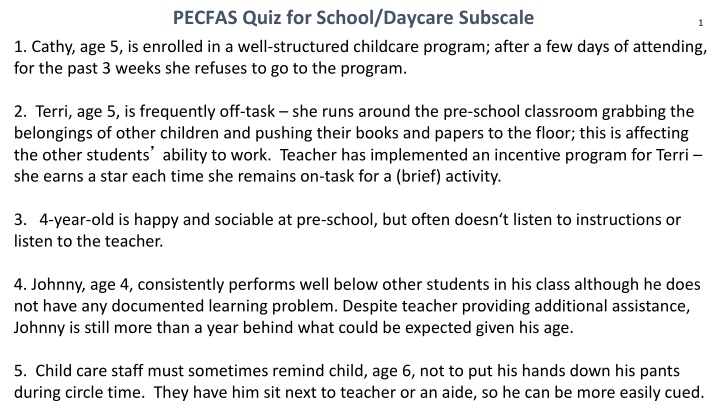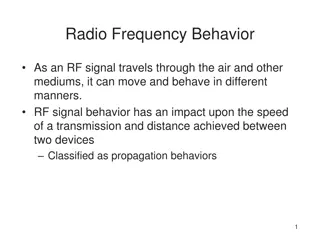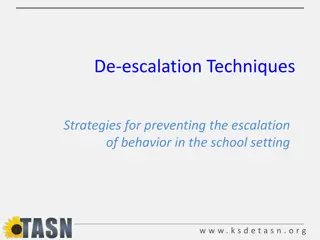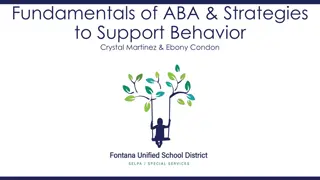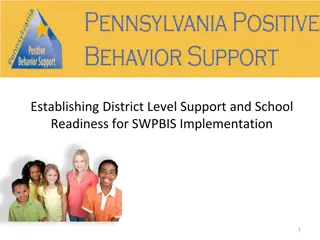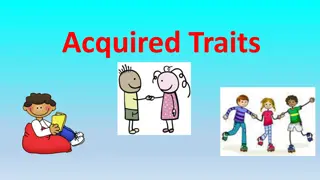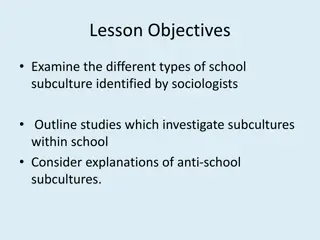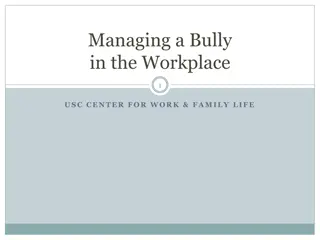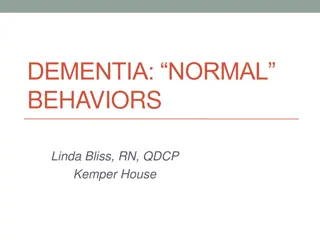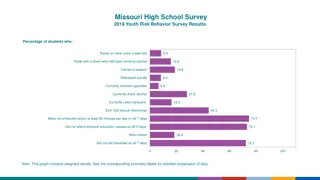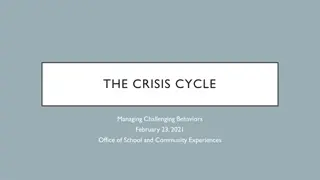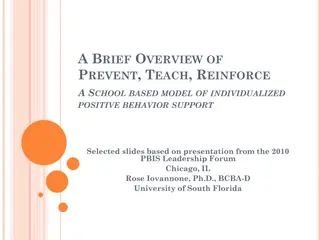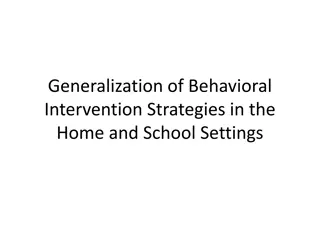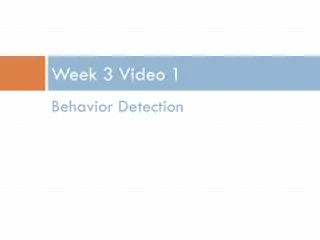Challenging Behaviors in School and Home Settings
In this collection of scenarios, we explore challenging behaviors exhibited by children in school and home environments, ranging from refusal to follow instructions and off-task behavior to aggression and defiance. These situations present various difficulties for teachers and caregivers, impacting the overall learning and well-being of the children involved. Strategies such as incentives, separation, and close monitoring are implemented to address these behaviors and support the children effectively.
Download Presentation

Please find below an Image/Link to download the presentation.
The content on the website is provided AS IS for your information and personal use only. It may not be sold, licensed, or shared on other websites without obtaining consent from the author.If you encounter any issues during the download, it is possible that the publisher has removed the file from their server.
You are allowed to download the files provided on this website for personal or commercial use, subject to the condition that they are used lawfully. All files are the property of their respective owners.
The content on the website is provided AS IS for your information and personal use only. It may not be sold, licensed, or shared on other websites without obtaining consent from the author.
E N D
Presentation Transcript
PECFAS Quiz for School/Daycare Subscale 1 1. Cathy, age 5, is enrolled in a well-structured childcare program; after a few days of attending, for the past 3 weeks she refuses to go to the program. 2. Terri, age 5, is frequently off-task she runs around the pre-school classroom grabbing the belongings of other children and pushing their books and papers to the floor; this is affecting the other students ability to work. Teacher has implemented an incentive program for Terri she earns a star each time she remains on-task for a (brief) activity. 3. 4-year-old is happy and sociable at pre-school, but often doesn t listen to instructions or listen to the teacher. 4. Johnny, age 4, consistently performs well below other students in his class although he does not have any documented learning problem. Despite teacher providing additional assistance, Johnny is still more than a year behind what could be expected given his age. 5. Child care staff must sometimes remind child, age 6, not to put his hands down his pants during circle time. They have him sit next to teacher or an aide, so he can be more easily cued.
2 PECFAS Quiz for School/Daycare Subscale 6. Childcare staff must regularly separate Sally, age 5 from two other children during small-group activities because it leads to arguing and them all being generally off-task. If allowed to play with these two, Sally is disobedient to teacher when asked to sit down or stop arguing. 7. 6- year-old typically acts his age but has occasional temper tantrums at school since his parents got divorced last month. 8. 4-year old child has been asked to leave child care program because he has repeatedly bitten other children. 9. 5-yr old child is not completing work correctly or satisfactorily because he does not pay attention when directions are given. He has been placed at the front of the classroom so that teacher can help keep him on-task. 10. Child, age 6 is very wiggly and fidgety while teacher is talking much more so than her classmates - but still completes work satisfactorily and doesn t disrupt others. She responds well to teacher.
3 PECFAS Quiz Scoring for Home Subscale 1. 4-year-old boy says that he s going to run away and leaves home, goes to a friend s house, asking friend s mother if he can stay. 2. 6-year-old typically acts age-appropriately but sometimes cries and whines to compete for attention with new baby in the family. 3. Parents don t take Frank, age 5 to a restaurant because he is such a picky eater that he often can find nothing that he likes on the menu. 4. Pat, a 4-year-old repeatedly throws temper tantrums and screams at her parents that she hates them when she does not get her way. 5. 5-year-old is placed in temporary foster care after trying to smother baby brother with a pillow.
4 PECFAS Quiz Scoring for Home Subscale 6. Even though 6-year-old Mandy knows how to tie her shoes, she sometimes insists on having mom or dad do it for her. 7. George, age 4, repeatedly takes his clothes back off after dad helps him to get dressed and this happens almost every day. 8. Amanda, age 5, generally behaves okay but occasionally goes through periods of several days being uncooperative and disobedient. 9. 6-year-old cries and pouts when mom is talking on the phone rather than paying attention to her. 10. At every mealtime, Betsy, a 5-year-old child, will not eat any food without Mom feeding her.
PECFAS Quiz for Community Role Performance 5 1.Mike, age 6 has been repeatedly caught playing with matches and lighting small pieces of paper towels in the kitchen despite warnings about the danger of fire. 2. Child, age 5, has repeatedly stolen toys and comic books from neighborhood store. Child is fully aware that it is wrong to steal. 3. Katie, age 4, once got in trouble after being caught picking roses from a neighbor, but problem was resolved after neighbor spoke to child. 4. 4-yr old sometimes plays with other children who have been known to bully younger children in the neighborhood. 5. 5-year-old boy has attempted, on more than one occasion, to get 3-year-old child next door to touch his penis.
PECFAS Quiz for Community Role Performance 6 6. 5-year-old child plays with dolls in such a way that they appear to be having sex he does this repeatedly and parents of neighbor kids don t want their children to play with him they are worried about the welfare of their children. 7. 4-year-old took candy from the local gas station even though mom has caught her before and told her that it is wrong to steal. 8. 5-year-old boy has threatened on more than one occasion to beat up a younger child in the neighborhood if the child tells on him. 9. 4-year-old boy set fire to neighbor s doghouse to see what dog would do if it was on fire. 10. 5-year-old s regular playmates are children who have gotten into trouble for vandalizing playground equipment at local school.
PECFAS Scoring for Behavior Toward Others 1. Chris, age 4 and her playmates will playfully tease one another about liking boys in their class, but Chris stomps away and won t talk to friends for a couple of days afterwards when she is the target of the teasing. 7 2. 5-year-old is encopretic (has bowel movement in pants) at pre-school and doesn t change his clothes after defecating until his teacher makes him, resulting in all of the other children in the school rejecting him. 3. 4-year-old boy has had a couple of arguments with his best friend over toys within the last month. Previously, he and his friend have gotten along very well. After arguing, they were able, with mom s help, to talk about the problem and resolve it. 4. Child, age 4, usually plays by himself, even though he is enrolled in after-school childcare and there are many opportunities for child to play with others his age. 5. 5-year-old has no friends, due to physically hitting and pushing other kids. Parents of other children have complained about the child s aggressiveness.
8 PECFAS Scoring for Behavior Towards Others 6. Neighborhood children make fun of 5-year-old who often cries when he doesn t get his way. 7. 5 year old girl throws temper tantrums, often in restaurants, stores and other public places, several times a day. 8. 4-year old tortures family cat by hitting it with a hammer, and locking in the closet despite mom and dad s attempts to stop behavior. 9. 5-year-old often tells friends what to do while they are playing (i.e., always has to be the boss or teacher in role-playing situations). 10.Mother observes her 5-year-old repeatedly being purposefully mean to the family dog by pulling it s tail and poking at it.
9 PECFAS Quiz for Moods/ Emotions 1. 4 year old girl is depressed and refused to go to school for 2 weeks after mother was diagnosed with breast cancer. Child seems worried and doesn t want to leave mother. 2. John s (age 5) feelings are hurt very easily if he makes even minor mistakes. He is more distressed by this than most kids his age. 3. 5-year-old insists on sleeping in bed with her mother, despite mother wanting the child to sleep in her own bed, because child is extremely fearful of typical old-house creaks. 4. 5-year-old child generally acts her age but since a new baby sister has arrived, sometimes sucks her thumb. 5. 5 year old is sad much of the time, takes a long time to fall asleep at night despite trying, and has decreased appetite.
10 PECFAS Quiz for Moods/ Emotions 6. 4 year old child cries all day at preschool because he wants to be with his mother, and preschool staff have been unable to calm him. 7. 5 year old boy has become anxious- has nightmares about three times a week. 8. 4 year old child cries for long periods when left with the sitter, although sitter can usually calm child down after some time has passed. 9. 4 year old appears sad at daycare for a couple of days at a time then returns to normal bubbly self before showing signs of sadness again. 10. Child (age 6) seems strange to other children because her mood often appears totally unrelated to what is happening around her.
11 PECFAS Quiz for Self-Harmful Behavior 1. 4 year old boy has talked about wanting to kill himself several times. Says he doesn t really want to be dead. 2. 5 year old girl ran out into the busy street when angry, even though parents have made her aware of the danger. 3. 6 year old boy likes to play Superman by jumping down a couple of steps with his cape flowing behind him. 4. 5-year-old girl used scissors to cut her arm repeatedly after being transferred to a new school. Denied wanting to kill herself. 5. 5 year old has numerous small marks on hands. He indicated that it is from using a paper clip to scratch himself. 6. 5 year old boy repeatedly bangs head hard against the wall despite efforts to stop him. 7. 5-year-old boy says that he is going to kill himself with his toy gun after frequently telling family members that he doesn t want to live anymore.
PECFAS Quiz for Thinking/Communication 12 1. 4 year old child sometimes pretends to talk to imaginary friends (i.e., pretends that friends are in the car or at the restaurant with family). Mother reports that child s brother did the same thing at her age. 2. 6 year old boy constantly rocks back and forth in his seat, humming loudly. He has been removed from specialized preschool classroom for the disruption that he caused to the classroom environment. 3. Teacher reports that a 5 year old is preoccupied with death; he is constantly drawing pictures of dead people and animals. His interest in this, as reflected in writing and artwork, is much more than is typical for kids his age. Referred to counselor for these concerns. 4. 4 year old won t talk to others outside of his family, despite being capable of doing so; he hasn t been diagnosed with any physical or sensory disability. Mother says that this is unusual for her family/culture.
13 PECFAS Quiz for Thinking/Communication 5. 5 year old child frequently shares thoughts that are disorganized and not relevant to situation, more than other children of the same age. 6. 6 year old expresses that others are out to get him, blames explosive behaviors on command voices, and states that he sees aliens when he looks outside. 7. 4 year old frequently eats pencil erasers. 8. 6 year old child frequently paces around the living room. He does it for no apparent reason and does not want to be disturbed while doing it. 9. 4 year old girl sometimes has trouble expressing self verbally, more than other children her age, resulting in the child often feeling frustrated and showing these frustrations in physical ways (throwing down pencil, banging head with fists, hitting others, etc.). 10. 5 year old has odd speech patterns, more than other children his age, which sometimes make it difficult for others to understand him.
